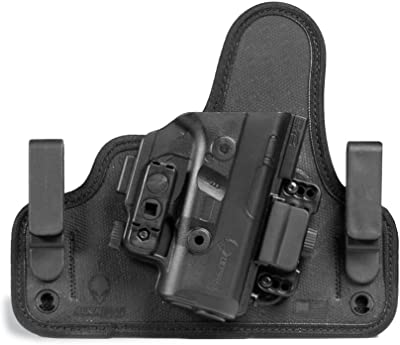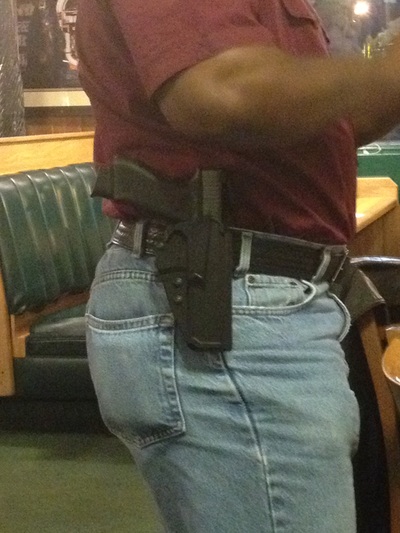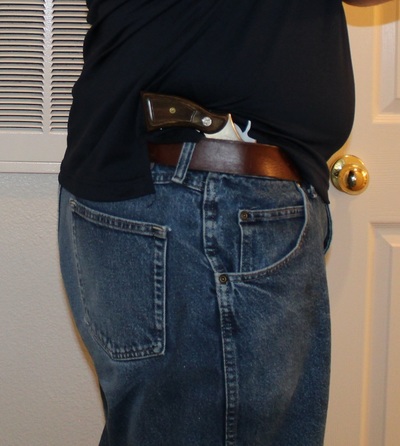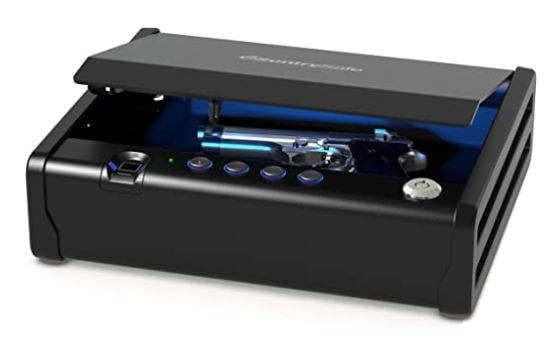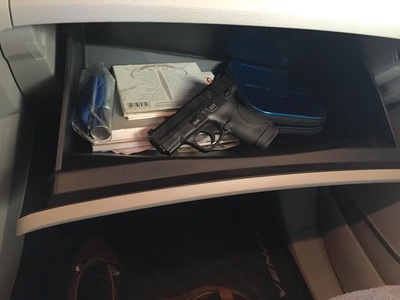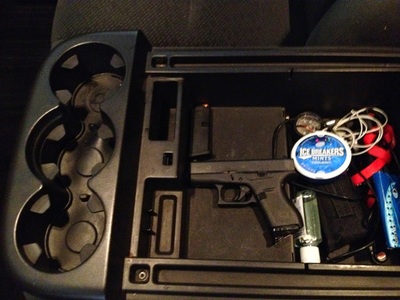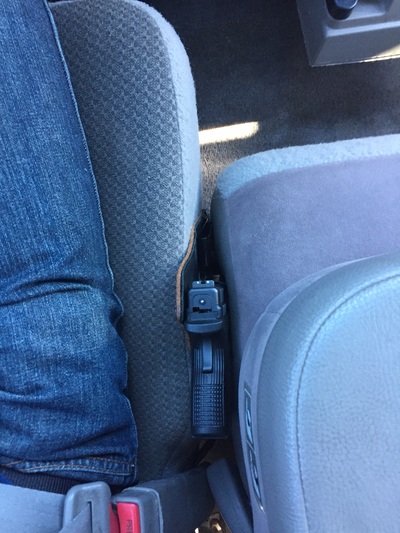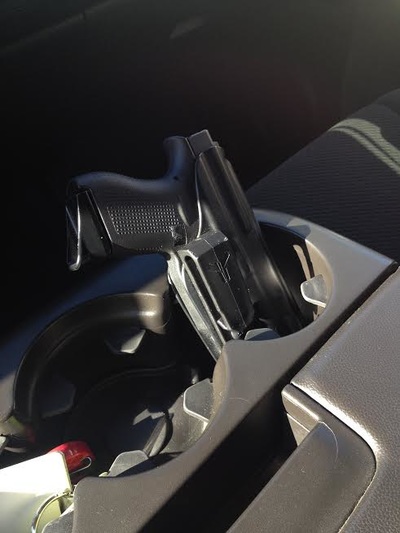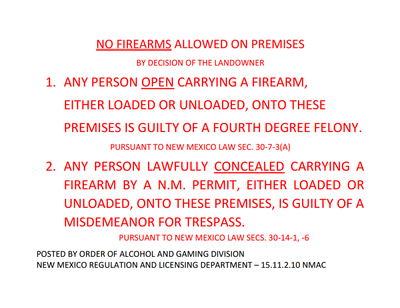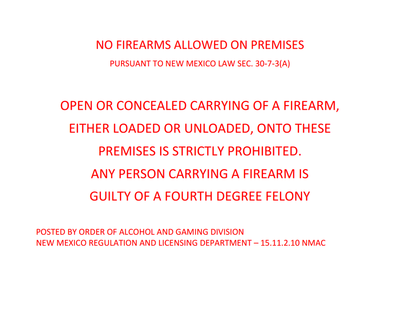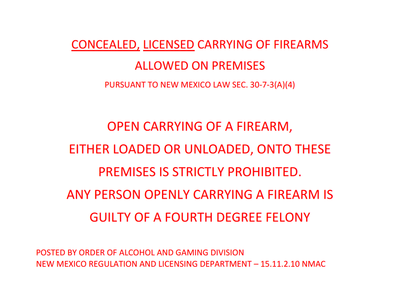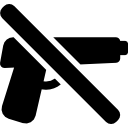Basic Firearm Carry Laws of New Mexico
Open Carry
New Mexico does not have any specific laws allowing or generally disallowing open carry. Anyone 18 or older may openly carry a firearm, however, to carry in a vehicle on school or college/university property one must be 19 or older (see below).
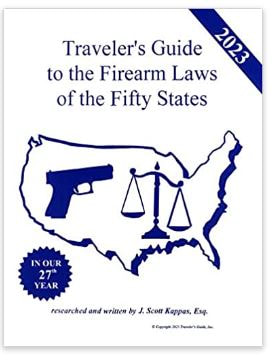
An openly carried loaded handgun that is one visible to the ordinary observations of a reasonable person (from the definition of "concealed handgun," 29-19-2D). If you can see it and tell that it is a handgun, it is open carry.
Is open carry brandishing?
Brandishing is not defined by New Mexico law. Brandishing is usually interpreted as drawing or pointing a firearm at another to intimidate or threaten with violence, outside of self-defense. Handling or using a firearm or other deadly weapon in a negligent manner is prohibited, 30-7-4(3). The assault statute ("threat or menacing conduct") could be applied depending on your behavior and the officer's discretion, 30-3-1. This generally would be more applicable when there was objective, disruptive behavior or reckless handling of a long-gun.
Can I open carry a rifle or a shotgun?
New Mexico has no laws on carrying openly a long gun (rifle or shotgun). Please use discretion when doing so; while it is your right to carry a long gun in public, it does tend to alarm the public, even in gun-friendly communities. Pistols have been a normal part of daily self-protection throughout the United States since its inception and are intended for such daily carry purposes. Please don't carry into the state capitol just to make a point; you are allowed to openly carry handguns. Save openly carried long guns for dire circumstances when they're needed, such as a riot or a major disaster. Still, it's your right, so if you chose to openly carry a long gun, please exercise your right wisely.
Does my gun have to be visible from three sides?
No. The legal requirement for open carry is visible to the ordinary observation. If you can see it and tell that it’s a gun or a holster, it’s openly carried.
If I use an inside the waistband holster (IWB), and only the butt of my pistol is visible outside of my clothes, is that open carry?
Yes. The described method is also known as ‘Virginia Tuck’, stemming from a former Virginia law where concealed carry was illegal in bars, so patrons would tuck their shirt to expose the butt of their pistol to be considered openly carried.
Is open carry brandishing?
Brandishing is not defined by New Mexico law. Brandishing is usually interpreted as drawing or pointing a firearm at another to intimidate or threaten with violence, outside of self-defense. Handling or using a firearm or other deadly weapon in a negligent manner is prohibited, 30-7-4(3). The assault statute ("threat or menacing conduct") could be applied depending on your behavior and the officer's discretion, 30-3-1. This generally would be more applicable when there was objective, disruptive behavior or reckless handling of a long-gun.
Can I open carry a rifle or a shotgun?
New Mexico has no laws on carrying openly a long gun (rifle or shotgun). Please use discretion when doing so; while it is your right to carry a long gun in public, it does tend to alarm the public, even in gun-friendly communities. Pistols have been a normal part of daily self-protection throughout the United States since its inception and are intended for such daily carry purposes. Please don't carry into the state capitol just to make a point; you are allowed to openly carry handguns. Save openly carried long guns for dire circumstances when they're needed, such as a riot or a major disaster. Still, it's your right, so if you chose to openly carry a long gun, please exercise your right wisely.
Does my gun have to be visible from three sides?
No. The legal requirement for open carry is visible to the ordinary observation. If you can see it and tell that it’s a gun or a holster, it’s openly carried.
If I use an inside the waistband holster (IWB), and only the butt of my pistol is visible outside of my clothes, is that open carry?
Yes. The described method is also known as ‘Virginia Tuck’, stemming from a former Virginia law where concealed carry was illegal in bars, so patrons would tuck their shirt to expose the butt of their pistol to be considered openly carried.
Methods of open carry
State Parks

Loaded open carry is prohibited in state parks without a permit. The law does not specify which method licensed concealed carriers must use. Firearms cannot have a cartridge chambered in state parks, 19.5.2.21. Exceptions:
- Unloaded firearms (no cartridge in the chamber);
- Carrying a firearm in a private vehicle;
- Persons with a valid concealed handgun license;
- Legally licensed hunter during a designated hunting season and within park areas designated as open to hunting.
School/Campus Carry

It is illegal to carry a firearm on public school property in most cases, 30-7-2.1. Exceptions:
This includes and only applies to public schools:
Concealed handgun licensees may not carry a firearm on to the premises of a school or a preschool, 29-19-8.
- A student, instructor or other school-authorized personnel in an JROTC/ROTC program;
- State-authorized hunter safety training;
- A person conducting or participating in a school-approved program, class or other activity;
- A person older than 19 years of age on school premises in a private automobile.
This includes and only applies to public schools:
- The buildings and grounds, including playgrounds, playing fields and parking areas and any school bus of any public elementary, secondary, junior high or high school in or on which school or school-related activities are being operated under the supervision of a local school board;
- Any other public buildings or grounds, including playing fields and parking areas that are not public school property, in or on which public school-related and sanctioned activities are being performed. This subsection does not apply to private schools, non-school (park) playgrounds, or other places, unless an official public school activity is actually in process.
Concealed handgun licensees may not carry a firearm on to the premises of a school or a preschool, 29-19-8.
Can I carry a gun near a school? Don't I have to be 1000 feet away?
This is a federal law that is not enforced by New Mexico law enforcement and there is no applicable similar state law (unlike some states). You generally will not be prosecuted unless you are doing something else illegal, such as involved in gang activity or drug violations, that interest federal law enforcement. The law was intended to apply to drug dealers and gang members, not the law abiding citizen.
The Gun-Free School Zones Act of 1990 (GFSZA) basically states that one cannot "knowingly to possess a firearm [...] in "a school zone." 'School zone' is defined as "in, or on the grounds of, a public, parochial or private school; or (B) within a distance of 1,000 feet from the grounds of a public, parochial or private school." It includes all public roads and sidewalks within that 1,000 foot buffer zone. It does not apply on private property, to a licensed concealed firearm permittee (state law does prohibit guns on campuses except with written authorization), or an unloaded weapon in a locked container/rack.
The law was found unconstitutional in its original version, so, to skirt the constitutional issue, the language was altered to say that it was a matter of 'interstate commerce' as all guns have moved in interstate travel as part of manufacturing and shipping and thus under the authority of Congress.
This is a federal law that is not enforced by New Mexico law enforcement and there is no applicable similar state law (unlike some states). You generally will not be prosecuted unless you are doing something else illegal, such as involved in gang activity or drug violations, that interest federal law enforcement. The law was intended to apply to drug dealers and gang members, not the law abiding citizen.
The Gun-Free School Zones Act of 1990 (GFSZA) basically states that one cannot "knowingly to possess a firearm [...] in "a school zone." 'School zone' is defined as "in, or on the grounds of, a public, parochial or private school; or (B) within a distance of 1,000 feet from the grounds of a public, parochial or private school." It includes all public roads and sidewalks within that 1,000 foot buffer zone. It does not apply on private property, to a licensed concealed firearm permittee (state law does prohibit guns on campuses except with written authorization), or an unloaded weapon in a locked container/rack.
The law was found unconstitutional in its original version, so, to skirt the constitutional issue, the language was altered to say that it was a matter of 'interstate commerce' as all guns have moved in interstate travel as part of manufacturing and shipping and thus under the authority of Congress.
Universities/Colleges

It is illegal to carry a firearm on university/college property in most cases, 30-7-2.4. Exceptions:
- A student, instructor or other school-authorized personnel in an ROTC program;
- State-authorized hunter safety training;
- A person conducting or participating in a university-approved program, class or other activity;
- A person older than 19 years of age on university premises in a private automobile.

"University" includes a baccalaureate degree-granting post-secondary educational institution, a community college, a branch community college, a technical-vocational institute and an area vocational school. This includes:
A university shall conspicuously post notices on university premises that state that it is unlawful to carry a firearm on university premises.
- The buildings and grounds of a university, including playing fields and parking areas of a university, in or on which university or university-related activities are conducted;
- Any other public buildings or grounds, including playing fields and parking areas that are not university property, in or on which university-related and sanctioned activities are performed.
A university shall conspicuously post notices on university premises that state that it is unlawful to carry a firearm on university premises.
Parking lot carry
Anyone 19 years or older may carry a firearm entirely within a vehicle for their lawful protection, including on school property, and this would apply to concealed handgun licensees, 30-7-2.1. This is known as parking lot carry and it applies to both public schools and colleges/universities, 30-7-2.4.
Anyone 19 years or older may carry a firearm entirely within a vehicle for their lawful protection, including on school property, and this would apply to concealed handgun licensees, 30-7-2.1. This is known as parking lot carry and it applies to both public schools and colleges/universities, 30-7-2.4.
Car Carry
It is legal for anyone 19 and older to carry a firearm, openly or concealed, in a private vehicle (includes motorcycles) for lawful self-defense, 30-7-2(2). Concealed carry in a vehicle does not require a concealed handgun license. There is no "three foot rule" in New Mexico regarding how close or far away from your vehicle you can be for this exemption to apply. The DPS concealed carry FAQ page says:
New Mexico law allows a person who is not otherwise prohibited to have a concealed loaded firearm in his/her vehicle (including motorcycles and bicycles). If you are not licensed to carry concealed in this State or in a state that NM recognizes, you may not have the weapon concealed on your person when you exit your vehicle or motorcycle.

Parking lot carry
It is legal to carry a firearm in a private automobile or other private means of conveyance, for lawful protection of the person's or another's person or property, 30-7-2(2). There is an exemption for licensed liquor establishments "on that area of a licensed premises primarily used for vehicular traffic or parking," 30-7-3. The parking lot exemption also applies to schools, colleges, and universities.
It is legal to carry a firearm in a private automobile or other private means of conveyance, for lawful protection of the person's or another's person or property, 30-7-2(2). There is an exemption for licensed liquor establishments "on that area of a licensed premises primarily used for vehicular traffic or parking," 30-7-3. The parking lot exemption also applies to schools, colleges, and universities.

Bus carry
It is unlawful for any person without prior approval from the company to board or attempt to board a bus while in possession of a firearm upon his person or effects and readily accessible to him while on the bus, 30-7-13. Transported firearms must be carried in a baggage compartment inaccessible to the passenger while the bus is moving, 30-7-15.
It is unlawful for any person without prior approval from the company to board or attempt to board a bus while in possession of a firearm upon his person or effects and readily accessible to him while on the bus, 30-7-13. Transported firearms must be carried in a baggage compartment inaccessible to the passenger while the bus is moving, 30-7-15.
Methods of car carry
Private property

'No guns' signs on private property have the force of law for concealed carry only. Concealed handguns are prohibited on private property when 'no guns' signs are posted or by verbally notifying persons upon entering the property, 10.8.2.16F and 10.8.2.27 NMAC. Signs must be posted according to the standards of the trespassing statute (30-14-6). This does not apply to open carry except at establishments selling alcohol.
Alcohol

It is generally illegal to carry a firearm in an establishment licensed to dispense alcoholic beverages, unless it is a a restaurant licensed to sell only beer and wine that derives more than 60% of its income from the sale of food. If the business is posted or the citizen is asked to leave/disarm, then it is a gun-free zone regardless, 30-7-3.
It is illegal to carry a loaded or unloaded firearm on any premises licensed for the dispensing of alcoholic beverages (bars, restaurants). An owner, lessee, tenant or operator of the licensed premises or their agent/employees are exempt. Additional exemptions:
It is illegal to carry a loaded or unloaded firearm on any premises licensed for the dispensing of alcoholic beverages (bars, restaurants). An owner, lessee, tenant or operator of the licensed premises or their agent/employees are exempt. Additional exemptions:
- A person in that area of the licensed premises usually and primarily rented on a daily or short-term basis for sleeping or residential occupancy, including hotel or motel rooms;
- A person on that area of a licensed premises primarily used for vehicular traffic or parking (parking lot or gas station pump);
- For the purpose of temporary display, provided that the firearm:
- Made completely inoperative before it is carried onto the premises and remains inoperative while it is on the premises; and
- Under the control of the licensee or an agent/employee (they hold your gun).
A concealed handgun licensee may carry a concealed firearm (not open carry):
- At a licensed establishment that does not sell alcoholic beverages for consumption on the premises (grocery, package, liquor, or convenience store);
- A restaurant licensed to sell only beer and wine that derives no less than 60% of its annual gross receipts from the sale of food for consumption on the premises unless the restaurant has a sign posted, in a conspicuous location at each public entrance, prohibiting the carrying of firearms, or the person is verbally instructed by the owner or manager that the carrying of a firearm is not permitted in the restaurant (Figure ). You cannot carry in a restaurant with a full bar.
Example signs
Drinking alcohol
It is illegal to carry a firearm while under the influence of an intoxicant or narcotic, 30-7-4(2). No person shall consume alcohol while carrying a concealed handgun, 10.8.2.16B.
It is illegal to carry a firearm while under the influence of an intoxicant or narcotic, 30-7-4(2). No person shall consume alcohol while carrying a concealed handgun, 10.8.2.16B.
Where you can carry quick guide
Hover over image for answer

Indian reservations
Indian tribes can make their own laws regarding firearms and recognition of concealed weapon permits and allowance for open carry and recognition of concealed handgun licenses varies from reservation to reservation. Tribes cannot enforce tribal law on non-tribal members, though they can enforce state and federal law. It is impossible to provide general rules or advice when it comes to reservations. Reports of illegal stops, searches, seizures, and arrests by tribal police can be found online. Individual reservation police or authorities should be contacted for guidance and tribal law.
Indian tribes can make their own laws regarding firearms and recognition of concealed weapon permits and allowance for open carry and recognition of concealed handgun licenses varies from reservation to reservation. Tribes cannot enforce tribal law on non-tribal members, though they can enforce state and federal law. It is impossible to provide general rules or advice when it comes to reservations. Reports of illegal stops, searches, seizures, and arrests by tribal police can be found online. Individual reservation police or authorities should be contacted for guidance and tribal law.
